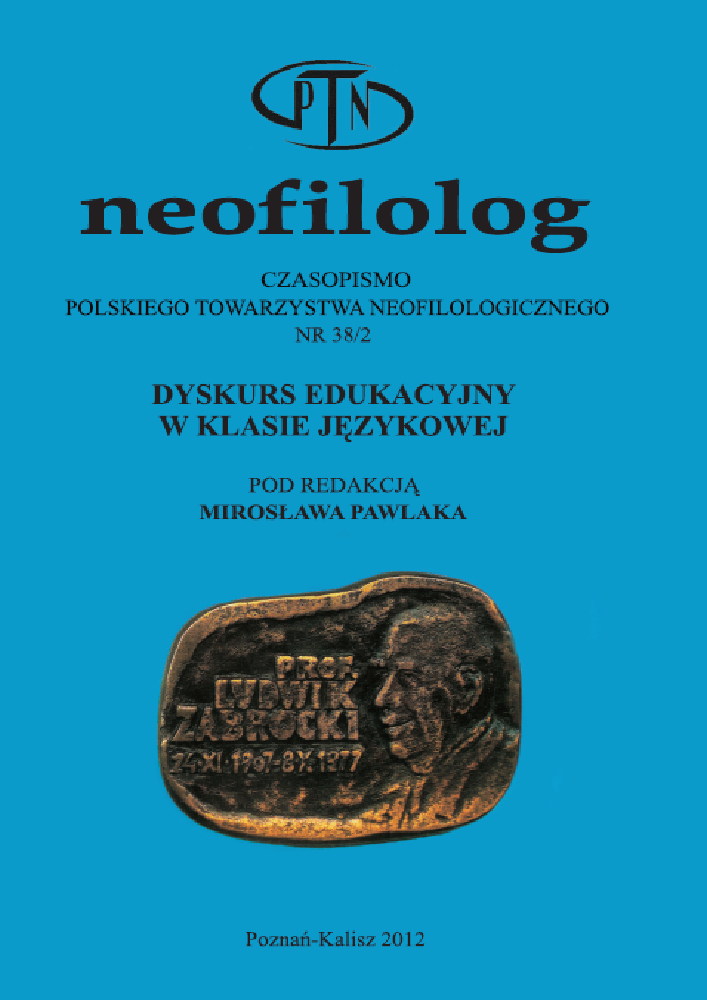Abstrakt
The purpose of the present paper is to investigate the phenomenon of social media in language teaching. After a brief definition of social media, a general picture of conditions for Internet-based teaching and learning in Poland will be presented, based on the data collected by statistical offices and the present authors. The major part of the paper will be occupied by a summary of the most important findings from a qualitative study into the perceptions of social media by language learners in Poland, Latvia and Romania. The study, operated within the European research network Language Learning and Social Media – Six Key Dialogues (LS6 Network) and funded with the support of the European Commission, consisted of 60 interviews carried out with individuals of varying degrees of computer use and familiarity with Web 2.0 technologies.
Bibliografia
Aharony, N. 2008. „Web 2.0 in U.S. LIS schools: are they missing the boat?” [w:] Ariadne 54 (http://www.ariadne.ac.uk/issue54/aharony/) [DW 29.07.2012].
Alexander, B. 2006. „Web 2.0: a new wave of innovation for teaching and learn-ing?” [w:] EDUCAUSE Review 41: 32-44.
Bax, S. 2003. „CALL – past, present and future”. [w:] System 31: 13-28.
Centralny Urząd Statystyczny Łotwy. 2009. On information society in Latvia. Ryga: Centralny Urząd Statystyczny.
Chambers, A. i Bax, S. 2006. „Making CALL work: Towards normalization”. System 34: 465-479.
Davis, I. 2005. „Talis, Web 2.0 and all that”. (http://blog.iandavis.com/2005/07/04/talis-web-2-0-and-all-that/) [DW 29.07.2012].
Eurobarometer Flash 241. 2008. Information society as seen by EU citizens. Bruksela: TNS Opinion & Social/Komisja Europejska.
Eurobarometer Special 335. 2010. E-communications household survey. Bruksela: TNS Opinion & Social/Komisja Europejska.
Gajek, E. 2008. Edukacja językowa w społeczeństwie informacyjnym. Warszawa: Insty-tut Lingwistyki Stosowanej Uniwersytetu Warszawskiego.
Gillingham, M. G. i Topper, A. 1999. „Technology in teacher preparation: Preparing teachers for the future”. Journal of Technology and Teacher Education 7: 303-321.
Główny Urząd Statystyczny. 2008a. Społeczeństwo informacyjne w Polsce. Warszawa: GUS.
Główny Urząd Statystyczny. 2008b. Edukacja i wychowanie w Polsce w roku szkolnym 2007/2008. Warszawa: GUS. (http://www.stat.gov.pl/cps/rde/xbcr/gus/PUBL_e_oswiata_i_wychowanie_2008-2009.pdf) [DW 29.07.2012].
Główny Urząd Statystyczny, Urząd Statystyczny w Szczecinie. 2010. Społeczeń-stwo informacyjne w Polsce. Wyniki badań statystycznych z lat 2006-2010. War-szawa: GUS. (http://www.stat.gov.pl/cps/rde/xbcr/szczec/ASSETS_Spol_Informacyjne.pdf) [DW 29.07.2012].
Grucza, F. 1988. „W sprawie pojęcia środków i materiałów glottodydaktycznych”. [w:] Grucza, F. (red.). Z teorii i praktyki tworzenia materiałów glottody-daktycznych. Warszawa: Wydawnictwa Uniwersytetu Warszawskiego. 9-26.
Hruby, J. i Wooden, J. 2006. „Learning 2.0. Applying the next generation of elearning tools and techniques”. Referat wygłoszony na Minnesota Government IT Sym-posium, St. Paul, 12.12.2006. (http://www.fredricksoncommunications.com/showcase/Learning2point0_by_Fredrickson_Communications.pdf) [DW 29.07.2012].
Kaczmarek, A. 2001. „Technologia informacyjna w samokształceniu językowym”. [w:] Płusa, P. (red.). Prace naukowe Wyższej Szkoły Pedagogicznej w Częstochowie. Studia Neofilologiczne. Tom 2 Częstochowa: Wydawnictwo WSP. 57-65.
Kaplan, A. M. i Haenlein, M. 2010. „Users of the world, unite! The challenges and opportunities of social media”. Business Horizons 53: 59-68.
Krajka, J. 2012. The language teacher in the digital age – towards a systematic approach to digital teacher development. Lublin: Wydawnictwo UMCS.
Krajka, J., Kurek, M., Maciaszczyk, S., Savlovska, D., Vlad, M. i Zourou, K. 2010. Social media and language learning: Beliefs, attitudes and uses in Latvia, Poland and Ro-mania. Luksemburg: Uniwersytet w Luksemburgu/Komisja Europejska. Raport badawczy Europejskiej sieci projektowej Language learning and social me-dia: 6 key dialogues. (http://www.elearningeuropa.info/en/directory/Social-media-and-language-learning%3A-beliefs,-attitudes-and-uses-in-Latvia,-Poland-and-Romania) [DW 29.07.2012].
MacManus, R. i Porter, J. 2005. „Web 2.0 for designers”. (http://www.digital-web.com/articles/web_2_for_designers/) [DW 29.07.2012].
McCarty, S. 2007. „Web 2.0 technologies for research and mobility”. [w:] Thomas, M. (red.). Wireless ready e-proceedings – podcasting education and mobile assisted language learning. 13-32. (http://wirelessready.nucba.ac.jp/eproceedings2007.html) [DW 29.07.2012].
O’Reilly, T. 2005. „Web 2.0: compact definition?” (http://radar.oreilly.com/archives/2005/10/web_20_compact_definition.html) [DW 29.07.2012].
O’Reilly, T. 2006a. „Web 2.0 compact definition: trying again”. (http://radar.oreilly.com/archives/2006/12/web_20_compact.html) [DW 29.07.2012].
O’Reilly, T. 2006b. „Levels of the game: the hierarchy of Web 2.0 applications”. (http://radar.oreilly.com/archives/2006/07/levels-of-the-game-the-hierarc.html) [DW 29.07.2012].
Prensky, M. 2001. „Digital natives, digital immigrants”. [w:] On the Horizon 9. (http://www.marcprensky.com/writing/Prensky%20-%20Digital%20Natives,%20Digital%20Immigrants%20-%20Part1.pdf) [DW 29.07.2012].
Prensky, M. 2004. „The emerging online life of the digital native”. (http://www.marcprensky.com/writing/Prensky-The_Emerging_Online_Life_of_the_Digital_Native-03.pdf) [DW 29.07.2012].
Thompson, J. 2007. „Is education 1.0 ready for Web 2.0 students?” Innovate 3. (http://www.innovateonline.info/index.php?view=article&id=393) [DW 29.07.2012].
Wilczyńska, W. 1999. Uczyć się czy być nauczanym? O autonomii w przyswajaniu języka obcego. Warszawa – Poznań: Wydawnictwo Naukowe PWN.
Zawadzka, E. 2004. Nauczyciele języków obcych w dobie przemian. Kraków: Oficyna Wydawnicza „Impuls”.
Licencja
Prawa autorskie (c) 1970 Jarosław Krajka, Sylvia Maciaszczyk

Utwór dostępny jest na licencji Creative Commons Uznanie autorstwa – Bez utworów zależnych 4.0 Międzynarodowe.
Przedstawiany utwór (artykuł) upubliczniany jest na podstawie umowy z autorem i na licencji Creative Commons Attribution-NoDerivatives 4.0 International (CC BY-ND 4.0).
Użytkownicy mają obowiązek podania wraz z rozpowszechnionym utworem, informacji o autorstwie, tytule, źródle (odnośniki do oryginalnego utworu, DOI) oraz samej licencji;
- bez tworzenia utworów zależnych,
- utwór musi być zachowany w oryginalnej postaci.
Uniwersytet im. Adama Mickiewicza w Poznaniu zachowuje prawo do czasopisma jako całości (układ, forma graficzna, tytuł, projekt okładki, logo itp.).
